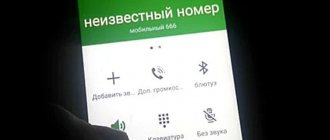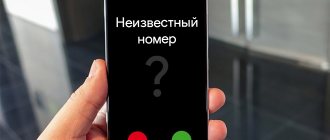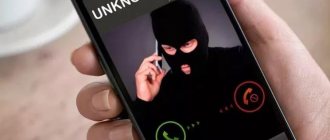Last modified: October 2021
Having connected the whole world with invisible mobile communications, a cell phone sometimes causes no less inconvenience and problems due to the activity of scammers, swindlers, and annoying advertising representatives. Every time a call comes from an unknown number, willy-nilly you have to decide a difficult question - to pick up the phone or not to answer. There are several ways to find out who called from an unknown number, and if this turns out to be impossible, to reduce the risk of fraud to a minimum level.
When mobile communications appeared, the problem of recognizing a calling phone number disappeared. Before answering an incoming call, the mobile owner already knows in advance who wants to contact you, seeing the numbers on the screen. If someone does not want to reveal their “incognito” identity, “anti-caller ID” comes to the rescue. Thanks to the development of technology, a new service has become available to mobile users, the so-called. “super caller ID” (abbreviated as SON). With the SON service activated, caller identification protection stops working, which allows you to decide independently whether to answer the call.
The first thing you want to do when you see a missed call is call the number back to find out the intentions of the caller. The problem is that on the other end of the line there may be a contact that is far from useful, and instead of a useful conversation, the person will be left with a zero balance. If the number is unknown, you can call back only if you can identify the subscriber, eliminating the risk of fraud.
Fraud is often discovered after the call has been detected. The amount is automatically debited from your mobile phone account at the end of a harmless conversation. Sometimes they don’t bother communicating at all. The less openness there is during fraud, the easier it is for criminals to hide from justice.
Having posted your contact information on public Internet services, you need to be prepared for a telephone attack from all sides - sellers, service centers, and representatives of various companies are striking in their intrusiveness. From the very morning, conversations begin about spa treatments, lucrative discounts, and unprecedented promotions. “Annoyers” are a new category of telephone society, politely and affably terrorizing subscribers whose data has become available to companies.
If you answer the call, you will receive a portion of advertising; if you ignore it, you will miss an important call. The problem is brewing: how to determine where the call is coming from, how to find out who called from a hidden number.
How to find out a hidden number from different telecom operators?
Following the “anti-caller ID” (anti-Caller ID), mobile operators have developed a new type of service – “Hidden Number Identifier”. The service reveals information about an incoming call, helping to identify the subscriber and guess his intentions.
Large mobile operators such as MTS or Beeline, along with younger operators like Yota, will eliminate doubts by showing an incoming hidden number on the screen, even if there is a subscriber on the line with an “anti-caller ID” or “super-caller ID” connected. True, the service is not free, and you will have to pay extra for peace of mind.
For MTS clients, AntiAON connection occurs using the command *111*46#. Disable the service by sending a request to MTS company *111*47#. You can prevent the phone from being shown to selected contacts - *111*84#, and to make a call, MTS clients dial the following combination #31#+7ХХХХ, where ХХХХ is the subscriber they plan to contact.
Megaphone
The SON service is 100% operational only within its region. It may not work correctly in other places. To activate the service, a Megafon subscriber dials *502#, to disable it - *502*4#. The connection itself is free, but the monthly tariff is 1.5 thousand rubles.
Tele 2
To identify the caller, Tele2 clients activate the “deliberately hidden numbers” service using the short command *210*1#. The service is provided with a charge of 4 rubles per day, plus an additional 4 rubles when you start using the service. Disabling is carried out using the ussd command *210*0#.
Beeline
Super-Caller ID from Beeline provides an identification service on a paid basis. The tariff for daily use is 50 rubles. The operator may additionally charge an amount for connection. The command to turn on “SLEEP” is *110*4161#, deactivation is *110*4160#.
The protection service against anonymous telephone terrorists is also available for subscribers of MTS, Yota, and other telecom operators. You should contact the hotline or explore the available options in your personal account on the operator’s website or through the personal account settings of the mobile application.
Who can call from an unknown number
If a person hides his number, you should not rush to label him a scammer, but you need to take into account that the subscriber prefers not to tell his interlocutor his number, depriving him of the opportunity to call back.
The very fact that a person prefers to remain anonymous gives reason to doubt the integrity of his intentions.
Important! When sending SMS or mms, the “anti-identifier” does not work and will be displayed on the mobile screen.
If the number is available, but it is not included in the contact list, there is a possibility that there may be a scammer on the line or a representative of a company advertising services.
If, in addition to calls, you receive SMS, the anonymity of the hidden number cannot be maintained either for MTS or Beeline subscribers, or for clients of younger cellular companies like Yota.
Punching a number through search engines
When publishing advertisements or information about yourself on forums or social networks, the owner of the phone must be prepared that the information becomes publicly available, which is often taken advantage of by scammers. Internet access also helps in identifying callers from unknown numbers, if they have at least once published information indicating their contacts.
Search engines will show the necessary data by checking information on various sites, including electronic bulletin boards. In this way, it is possible to find out not only the person’s name, but also the region where he is located and the history of his publications.
There is a special search engine bases-brothers.ru that helps you find a phone number if it was indicated when submitting ads, checking all Internet sources.
Number verification in Viber and WhatsApp
Instead of classic mobile communications, an increasing number of smartphone owners are happy to use Viber or WhatsApp, where, in addition to calls, subscribers publish their photos and additional information about themselves.
If an account with an unknown number does not have a photo, there is a risk that a scammer is trying to contact the person, although such verification is not entirely reliable - ordinary people also do not always upload their own photos.
Who sees my phone number?
After registering with Telegram, all the possibilities of the messenger are opened to the user. You need to understand the interface and functions. Afterwards, contact your friends, find interesting channels and chats. Because of this, setting up an account fades into the background.
Many people are not interested in who can see their phone. By default, the “My contacts” option is installed in the messenger settings.
In this case, your number is visible only to your contacts and those who have added you to their address book.
Who can see your phone depends on the settings you choose. If you have selected the item:
- All – visible to your contacts and all users
- My Contacts – Visible to people in your contact list and those who know it
- Nobody – not visible to anyone except those who already had it and the people you added to the “Exceptions”
What does it mean if they call from an unknown number and immediately hang up?
Common methods of fraud include call drops. Fraudsters dial the next victim’s number and then hang up without waiting for an answer. The expectation is that the person who did not have time to answer will call back to find out who is bothering him and why.
This is just what scammers are waiting for, making money by debiting funds from a mobile phone, since calls turn out to be paid. When deciding to call an unknown person back, you should first look up the number through search engines. If there is no information about the number anywhere, or there are negative reviews, you should give up trying to call back.
Scammers
To become the target of scammers, all you have to do is pick up the phone or call back an unknown number without first checking the number.
Anyone can become a victim of fraud, even if they did not publish any data and passed on information with their number to anyone. It can be dialed at random, and then in the conversation the criminals will try to find out all the necessary information, persuading you to transfer money or agree to services without warning about their payment.
Collectors
Collectors like to use hidden numbers. By hiding information, the collection agency representative hopes to maintain the company's anonymity, prompting the person to pick up the phone when calling from a hidden number. The debt collector’s victim is not always related to overdue debts to banks or other organizations.
Sometimes the number ends up in the collectors’ database by mistake, and in order to stop telephone attacks, you have to prove that the person has nothing to do with the debts. The collection agency office is asked to submit an agreement for the provision of mobile communication services, an extract from the mobile operator confirming that the contacts belong to a specific person.
Promotional offers
In order to convey information about goods and services, various companies resort to telephone calls. Advertising offers attack phone owners, offering to buy their own products and pay for the service. Some companies offer to undergo a free examination or consultation, but in the end the goal is always to get money from new clients.
The telephone base of such companies is formed in different ways. By agreeing to the processing of data by an insurance company, you can subsequently receive calls from credit institutions, agencies, and investment companies convincing you of the need for their services.
It is almost impossible to identify the source from where the number got into the telephone database for calling, and it is extremely difficult to bring to court for disseminating personal information, since it is not possible to prove the fact of a violation. When calls interfere with their lives, citizens deprived of peace prefer to change their SIM card.
Why is this being done?
Why does a person call and remain silent? There may be several reasons:
- The usual pampering. Modern children are as mischievous as the previous generation. And yes, sometimes they call the same number several times a day. This is simple hooliganism that throws the owner of the apartment in which the phone rings off balance.
- "Probing." Sometimes people who are planning to rob an apartment call it several times a day. This is done with the purpose of finding out whether someone is constantly present at home or whether the owners spend most of the day outside their residential area.
- Intimidation. As a rule, if they call and remain silent on the phone, this is an attempt to scare. Who needs this and why? Most often they call people associated with a business that has crossed someone's path. Competitors can also behave in such an impudent manner, trying to psychologically attack a person.
What to do if you receive a call from an unknown number
If the number is hidden or unknown, it is not safe to rush to answer the call or call back. The subscriber's number can be quickly checked using search engines, paying attention to reviews of special services with telephone databases of unwanted contacts.
By answering such a call, the subscriber risks becoming a victim of one of the many fraudulent schemes. Sometimes the caller introduces himself as a loved one who urgently needs money. Other scammers act as a representative of the bank's security service, offering to cancel a non-existent payment by dictating the password for your personal online banking account.
If a person decides to call back to a number that is not identified as useful, it should be taken into account that an amount may be charged for an outgoing call. The scammers don’t even bother with conversations - after receiving the call, an answering machine turns on, repeating texts of various contents. The longer the subscriber listens to the audio recording, the more expensive such a call back will cost.
Useful applications
Thanks to special applications, it is possible to instantly recognize whether an incoming call is a fraud attempt. If doubts are confirmed, you should add suspicious numbers to your smartphone’s “black list” or connect to a call blocker service. You can find corresponding applications to install on your smartphone in the GooglePlay store.
“Don't pick up the phone”
For devices on the Android platform, a special “Don’t pick up the phone” program is provided, which allows you to cut off all unwanted contacts. The essence of the service is to analyze the incoming call and check it against the local and general database. Each call is double checked - checking the personal contact book on the smartphone and the Internet database. To have up-to-date information about numbers, the database is updated from time to time.
A suspicious contact will not even bother the owner of the smartphone, since the system will automatically block the call.
"Security Master"
To find out who is calling from an unknown number, install the “Security Master” application for Android or iOS smartphones.
As soon as an incoming call appears on the screen, the application checks the number against online databases. The system will automatically determine whether the caller is from the banking industry or represents the interests of collectors.
After identifying the source of the call, the smartphone owner will be able to blacklist the unknown phone to get rid of worries forever.
Is it true that you can’t say “yes” when they call from an unknown number?
With the development of technology, a new version of fraud has appeared - just talk to a stranger and answer in the affirmative, confirming your personal data. Modern scammers have fairly complete information about the subscriber and may try to take a digital voice print. After a number of banks introduced voice identification, criminals had the opportunity to withdraw money and conduct transactions on behalf of the client using biometrics. To verify identity and gain access to funds in a victim's account, scammers need to have a digital snapshot of several phrases. This can easily be done through a call from a hidden number, leaving no trace of your crime.
Most often, criminals, hoping for an affirmative answer, ask:
- Do you agree?
- Will you try the free service?
- Shall we activate the service in test mode?
- Do you want to take part in the action?
To avoid falling for scammers, you should not answer “yes” or “I confirm” to any questions asked by strangers calling from unfamiliar numbers. Every time a person answers in the affirmative, even if they are asked to confirm their full name, they increase the chances of criminals.
Using blacklists from operators
The easiest way to reduce the number of unwanted calls is offered by mobile operators themselves. The Black List function is available on most mobile devices. If the owner of a smartphone does not want to be disturbed by calls from specific numbers, they are added to the unwanted list.
Mobile operators offer to configure the service through your Personal Account on the company website.
In addition to the service included in the list of settings on the smartphone, they use free applications from Google Play that allow you to disable notifications about an incoming call from an unwanted number.
We are struggling with calls
When they call and remain silent once, it doesn’t even register in your mind. But when this action happens regularly, it becomes downright scary. It’s okay, they won’t intimidate. If you take some actions, telephone hooligans will stop calling.
How to do it?
- Do not show your anger or fear under any circumstances. Do they call and remain silent on the phone? Play a funeral march for these callers a couple of times, they will leave right away. Just make sure first that this is a silent call again. So as not to inadvertently frighten some particularly impressionable relative.
- Try to answer in a way that is completely unexpected. For example, say that the police are listening. Or the emergency department of a maternity hospital. Or bailiff such and such. Works well too.
- Threaten the police, eventually. Clearly say into the phone that the caller’s number has been identified and transferred to the local police officer. Ill-wishers will leave behind in a moment.
- Pretend to be an answering machine. If you pull off a similar trick a couple of times, the impudent people will no longer have the desire to call.
- If calls are made to a mobile phone and the number is unknown, just don’t pick up the phone. Calling someone who doesn't answer is not at all interesting. The attackers will leave you alone.
Why shouldn't you call back?
Unfortunately, the risk of encountering scammers cannot be completely eliminated. Many incoming calls are still related to important issues - work, health, education, utilities. Even close people and friends sometimes change numbers, which makes it impossible to identify the person calling. Fearing that they might miss an important message, people start calling back and are met with silence. If we exclude a reason such as a technical failure, most likely money will be debited from the mobile balance.
Technological capabilities now allow you to withdraw money from your phone immediately after dialing the number, while the beeps are still ringing. It is extremely difficult to prove the fact of fraud in such situations, because the person himself decided to call without coercion.
Funds write-off scheme
It is very easy to part with money due to telephone fraud. The scheme for writing off funds is as follows:
- Preliminary preparation. An agreement is concluded with the telecom operator on a paid number, which involves automatic debiting of funds from anyone who decides to call.
- Fraudsters, having obtained a paid number, begin calling, hanging up after 3-5 seconds, or wait until the phone is picked up and end the call.
- The victim, trying to find out the reason for the call, calls back, and the operator, in accordance with the signed agreement on paid services, debits the funds.
- Having earned its commission, the mobile operator transfers the balance. The funds are transferred to the fraudster’s account minus the operator’s commission.
There are cases when criminals offer to take a survey on one of the current problems of society - about medicine, social support, education. Talking about painful things, a person loses a certain amount of rubles every minute. As a result, you have to pay a tidy sum for a false survey.
How to hold accountable and get your money back
Combating telephone fraud is difficult because it is almost impossible to prove the fact of fraud. The talents of the criminal world arrange the situation in such a way that the victim herself provides all the necessary information, opening access to the bank account. In the case of debiting funds for calling back to a paid number, the situation is almost hopeless, because legally everything is clear - no one forced the person to call back.
There is only one clue that will help bring criminals to justice - paid services and consultations, surveys require mandatory warning to the subscriber before the funds are written off (clauses 1, 2 of Article 10 of the Federal Law “On the Protection of Consumer Rights”).
If the money was written off without warning, you should try to return the money following the proposed algorithm:
- Get details of conversations for the last period (week) at the mobile operator’s office.
- Make a claim on the company’s letterhead or yourself.
- In a complaint addressed to the company's management, they describe the situation and demand a refund.
- A copy of the printout will serve as confirmation of the claim.
When composing the text, be sure to indicate that the consumer rights specified in paragraph 2 of Art. 10 of the federal law, and the subscriber was not warned that the service was paid.
The operator is obliged to accept the application for consideration and provide an official response within 45 days. As a rule, confirmed cases of fraud result in refunds within 14 days. The application must be submitted by the victim himself, the owner of the SIM card who has entered into an agreement for the provision of mobile communications.
If compensation is refused, they contact the police with a statement indicating the requirement to initiate a criminal case on the basis of an article on fraud (Article 159.3 of the Criminal Code of the Russian Federation).
Unfamiliar numbers - pick up or not
In the name of security, every unknown number should be verified. If you cannot determine where the call is coming from, do not rush to call back. Pre-checking through special mobile services and checking through websites will save you from unpleasant proceedings in connection with the loss of funds.
Every time you call back in an unknown direction, assess the risks. No one can guarantee that the call will be free.
When answering a call from an unfamiliar number, be vigilant, avoiding clear affirmative answers and transmitting any information about yourself and your loved ones.
Let's summarize
We talked about what to do when they call and are silent on the phone. Let us highlight the main aspects of the article:
- This is not necessarily telephone terrorism. Children, banks, collectors, fly-by-night companies can call; this can be to check the subscriber’s activity.
- When calls become too annoying, the best way to protect yourself is to contact the police.
- Do not indicate your phone number on social networks and on dubious sites.
- To get rid of calls, sometimes a non-standard approach to answering them is enough.
Other dangers
If the call turns out to be free, don’t rush to rejoice. Unscrupulous representatives of some companies offer to remotely sign up for an unnecessary paid service, subscribe to newsletters, or provide consultations at a super discount. As a rule, law-abiding companies that provide quality service will not force their services.
When agreeing to send information about discounts, mobile subscribers are surprised to find their balances cleared to zero, since words about the paid service went over the client’s ears.
How to protect yourself from scammers
There is only one way to fight scammers - follow security rules using the following techniques:
- Try sending an SMS in response to a missed call.
- Call back from another SIM card, where the balance is near zero.
- Download and use a special recording program for telephone communications.
- Enter unwanted numbers into the blacklist.
- If you are waiting for an important call, but do not know the exact number, after missing the call, call the operator back and clarify whether the call to this contact is chargeable.
- Before answering the call, check the number using the databases that are freely available on the Internet.
- Do not download files from unknown sources, including SMS from unknown numbers.
- Set a SMS ban on paid short numbers if there is a possibility of accidentally connecting to an unnecessary service imposed in SMS and instant messages.
- When answering any questions from strangers, avoid using words that may later be used for confirmation and authorization - full name, affirmative “yes”, “agree”, “I confirm”, etc.
By applying simple security measures, the owner of a smartphone protects himself from the undue attention of scammers. If the masterminds of the underworld nevertheless write off money from the account, recording calls will help settle the refund with the telecom operator, or will become evidence of fraud when initiating a criminal case.









